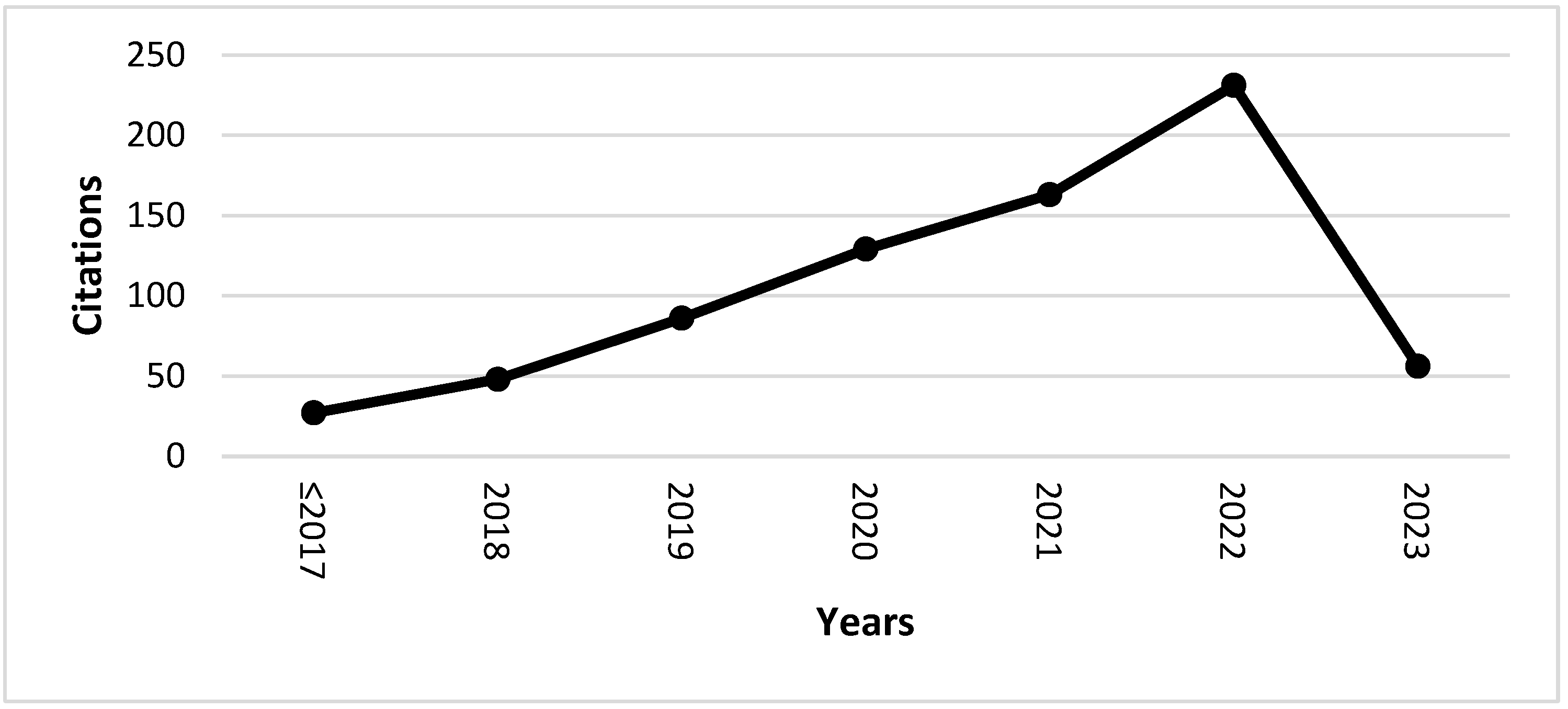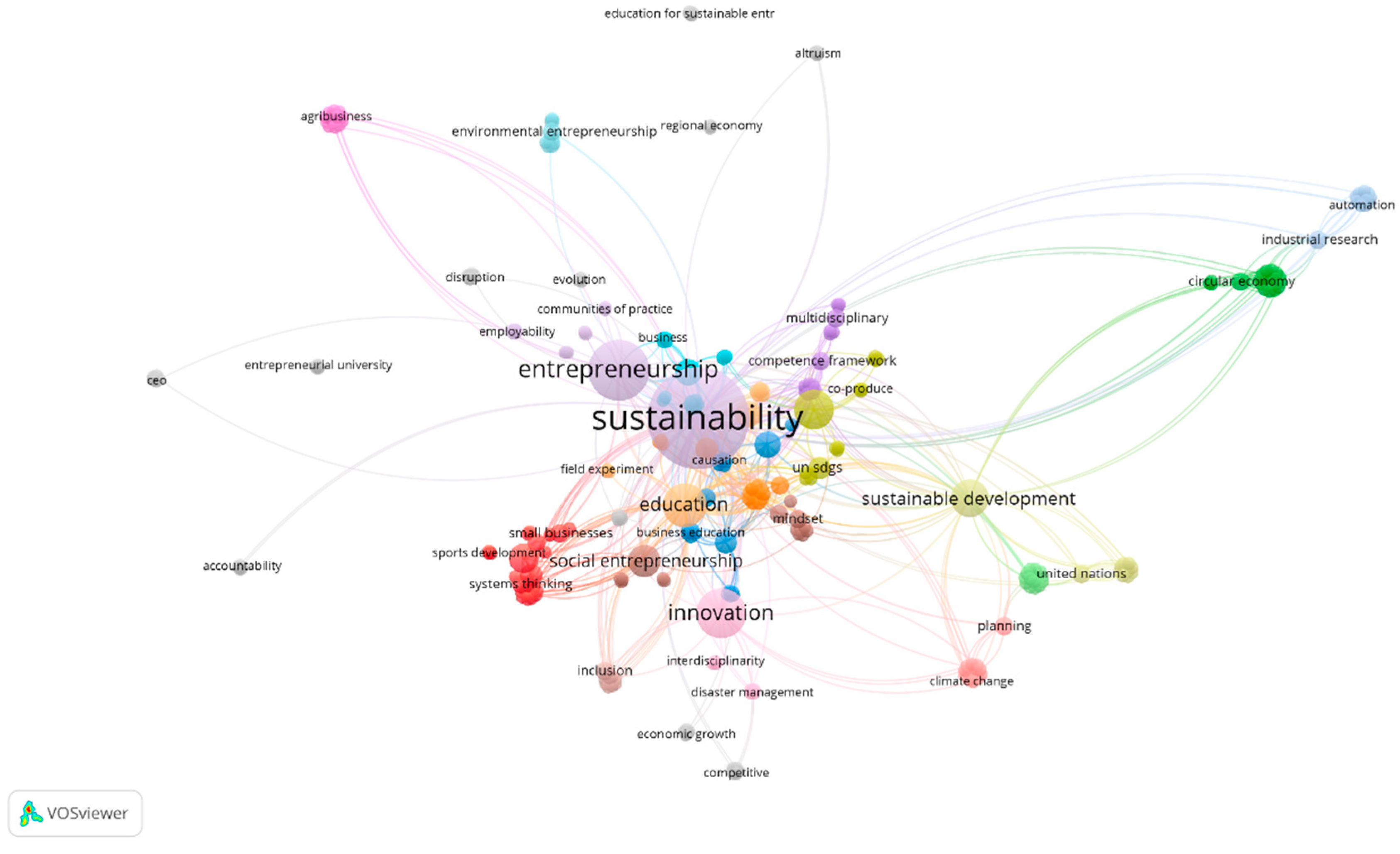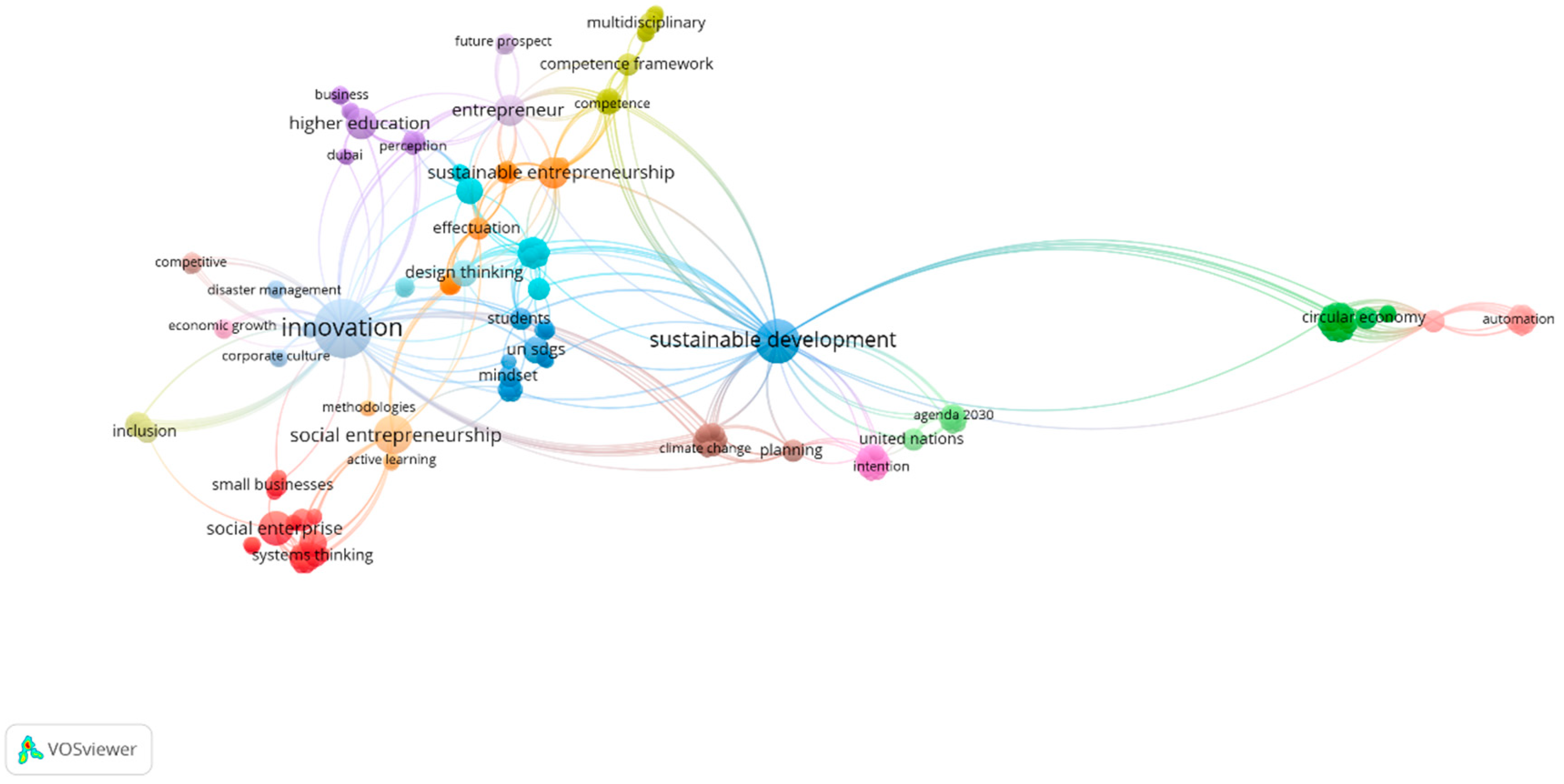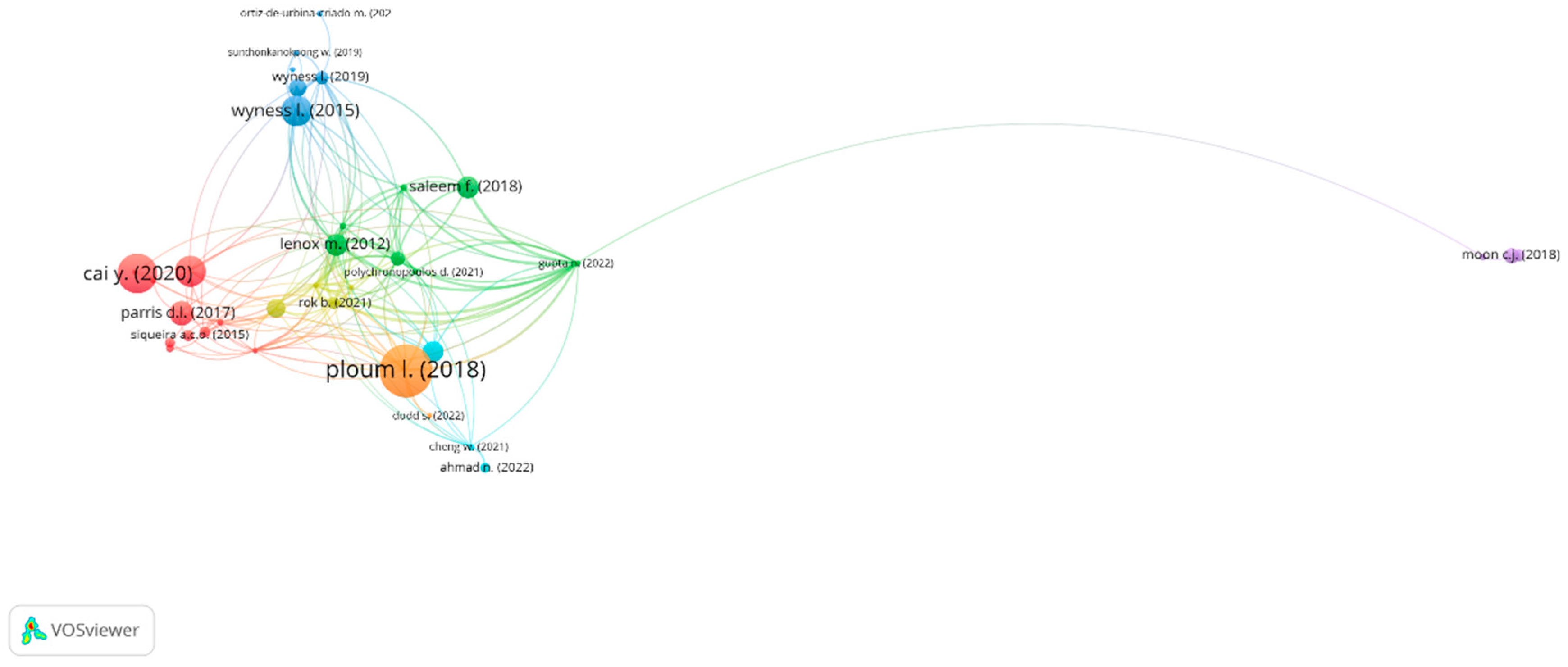Submitted:
28 April 2023
Posted:
29 April 2023
You are already at the latest version
Abstract
Keywords:
1. Introduction
2. Materials and Methods
3. Literature analysis: themes and trends
| Title | SJR | Best Quartile | H index |
|---|---|---|---|
| Technological Forecasting And Social Change | 2,340 | Q1 | 134 |
| Business Strategy And The Environment | 2,240 | Q1 | 115 |
| Journal Of Cleaner Production | 1,920 | Q1 | 232 |
| Entrepreneurship And Regional Development | 1,770 | Q1 | 96 |
| Organization And Environment | 1,620 | Q1 | 64 |
| Accounting Auditing And Accountability Journal | 1,470 | Q1 | 105 |
| Labour Economics | 1,200 | Q1 | 79 |
| Global Journal Of Flexible Systems Management | 1,180 | Q1 | 37 |
| Management Decision | 1,160 | Q1 | 106 |
| Journal Of Competitiveness | 0,930 | Q1 | 12 |
| Corporate Governance Bingley | 0,850 | Q1 | 64 |
| International Journal Of Management Education | 0,820 | Q1 | 34 |
| Journal Of Management Education | 0,640 | Q2 | 51 |
| Education And Training | 0,610 | Q2 | 71 |
| British Food Journal | 0,610 | Q2 | 86 |
| Journal Of Entrepreneurship In Emerging Economies | 0,580 | Q1 | 21 |
| International Journal Of Entrepreneurial Venturing | 0,510 | Q2 | 20 |
| Journal Of Small Business And Entrepreneurship | 0,510 | Q2 | 33 |
| Journal Of Business Economics And Management | 0,490 | Q2 | 41 |
| Journal Of Management History | 0,490 | Q1 | 22 |
| Administrative Sciences | 0,480 | Q2 | 23 |
| Worldwide Hospitality And Tourism Themes | 0,390 | Q2 | 24 |
| International Journal Of Innovation And Sustainable Development | 0,280 | Q3 | 23 |
| International Journal Of Innovation And Learning | 0,240 | Q3 | 27 |
| Journal Of Technology Management And Innovation | 0,240 | Q3 | 30 |
| Problems And Perspectives In Management | 0,240 | Q2 | 23 |
| Springer Proceedings In Business And Economics | 0,240 | Q2 | 23 |
| Emerald Emerging Markets Case Studies | 0,230 | Q3 | 7 |
| Transylvanian Review Of Administrative Sciences | 0,220 | Q3 | 18 |
| Universidad Y Sociedad | 0,130 | Q4 | 4 |
| Proceedings Of The European Conference On Innovation And Entrepreneurship Ecie | 0 | -* | 6 |
| 2021 IEEE International Conference On Engineering Technology And Innovation ICE Itmc 2021 Proceedings | 0 | -* | 7 |
| Contemporary Issues In Entrepreneurship Research | 0 | -* | 8 |
| Corporate Ownership And Control | 0 | -* | 21 |
| Entrepreneurship And Sustainability Issues | 0 | -* | 30 |
| Entrepreneurship Education And Pedagogy | -* | -* | -* |
| Entrepreneurship Education Opportunities Challenges And Future Directions | -* | -* | -* |
| Green Behavior And Corporate Social Responsibility In Asia | -* | -* | -* |
| Humanistic Management Journal | -* | -* | -* |
| Journal Of The International Council For Small Business | -* | -* | -* |
| New England Journal Of Entrepreneurship | -* | -* | -* |
| Oxford Handbook Of Business And The Natural Environment | -* | -* | -* |
| Strategies And Best Practices In Social Innovation An Institutional Perspective | -* | -* | -* |
| Triple Helix | -* | -* | -* |
4. Theoretical perspectives
4.1. Educational Approaches
4.2. Innovation
4.3. SDG
4.4. Sustainable Context of Social Entrepreneurship
4.6. Circular Economy
5. Conclusions
Author Contributions
Funding
Data Availability Statement
Acknowledgments
Conflicts of Interest
Appendix A
| Documents | 2017 | 2018 | 2019 | 2020 | 2021 | 2022 | 2023 | Total | |
|---|---|---|---|---|---|---|---|---|---|
| The role of innovation and tourism in sustainability: wh… | 2022 | - | - | - | - | - | - | 4 | 4 |
| Examining the enablers of sustainable entrepreneurship… | 2022 | - | - | - | - | - | - | 1 | 1 |
| Harmonious entrepreneurship: evolution from wealth… | 2022 | - | - | - | - | - | 2 | - | 2 |
| Determinants of entrepreneurial alertness: towards… | 2022 | - | - | - | - | - | 2 | - | 2 |
| Reinforcing or counterproductive behaviors for… | 2022 | - | - | - | - | - | - | 1 | 1 |
| A disruptive model for delivering higher education… | 2022 | - | - | - | - | - | 3 | 1 | 4 |
| Transforming enterprise education: sustainable… | 2022 | - | - | - | - | - | - | 1 | 1 |
| Sustainability and entrepreneurship: emerging opportun… | 2022 | - | - | - | - | - | 2 | 1 | 3 |
| [Towards a study model for the promotion of associative… | 2021 | - | - | - | - | - | 1 | - | 1 |
| Exploring the core values of entrepreneurs:… | 2021 | - | - | - | - | 1 | - | - | 1 |
| lnnovation Framework for Excellence in Higher… | 2021 | - | - | - | - | 2 | 3 | 1 | 6 |
| A Resource-EfFcient Modular Course Design for… | 2021 | - | - | - | - | 1 | 4 | - | 5 |
| Circular start-up development: the case of positive imp… | 2021 | - | - | - | - | 1 | 2 | 3 | 6 |
| Corporate entrepreneurship education’s impact on famil… | 2021 | - | - | - | - | 1 | 3 | 2 | 6 |
| GrowBox: the reality of growth challenges for a social… | 2021 | - | - | - | - | - | 1 | - | 1 |
| Entrepreneurship channels and sustainable development… | 2021 | - | - | - | - | - | 2 | - | 2 |
| Beyond making a profit: Using the UN SDGs in entrep… | 2021 | - | - | - | - | 2 | 1 | - | 3 |
| Entrepreneurship education challenges for green transf… | 2021 | - | - | - | - | 2 | 5 | - | 7 |
| CEO characteristics and sustainability business model in… | 2020 | - | - | - | 1 | 6 | 6 | 1 | 14 |
| Systems Thinking as a Tool forTeaching Undergraduate… | 2020 | - | - | - | 1 | 1 | - | - | 2 |
| The integration of management accounting practices as… | 2020 | - | - | - | - | 1 | 1 | - | 2 |
| Discovery Digital Health strategy: COVID-19 accelerates… | 2020 | - | - | - | - | 3 | 2 | 2 | 7 |
| Theorizing the Tripie Helix model: Past, present, and… | 2020 | - | - | - | 2 | 13 | 36 | 11 | 62 |
| From NPO to social enterprise: the story of Schwab… | 2019 | - | - | - | - | - | 1 | - | 1 |
| Boundary crossing ahead: perspectives of entrep… | 2019 | - | - | - | 1 | 5 | 1 | - | 7 |
| lnnovation-centric courses in hospitality management… | 2019 | - | - | 1 | - | - | - | - | 1 |
| Silulo Ulutho Technologies: African social enterprise… | 2019 | - | - | - | - | - | 1 | - | 1 |
| The mindset of Eco and social entrepreneurs: Piloting… | 2019 | - | - | - | - | 1 | 1 | - | 2 |
| Environmental orientation among nascent and establ… | 2019 | - | - | - | 2 | 6 | 1 | - | 9 |
| The teaching of innovation and environmental sustainab… | 2019 | - | - | 1 | 2 | 3 | 5 | 2 | 13 |
| lntentions to adopt ecopreneurship: Moderating role of… | 2018 | - | 3 | 7 | 2 | 4 | 2 | 1 | 19 |
| Sustainable social innovations in smart cities: Expl… | 2018 | - | - | - | 2 | 1 | - | - | 3 |
| Toward a Validated Competence Framework for Sust… | 2018 | - | 8 | 27 | 12 | 24 | 37 | 3 | 111 |
| DesigningWith Purpose: Advocating lnnovation, lmp… | 2018 | - | 2 | 3 | 3 | 9 | 17 | 4 | 38 |
| Contributions to the sdgs through social and eco entrep… | 2018 | - | - | 1 | 4 | 3 | 1 | 1 | 10 |
| Sustainable entrepreneurship education: A challenging… | 2018 | - | - | - | - | - | 1 | - | 1 |
| Marketing challenges for south african public sector… | 2017 | - | - | 2 | - | - | - | - | 2 |
| Business Notas Usual: Developing Socially Conscious… | 2017 | - | - | 4 | 5 | 8 | 5 | 2 | 24 |
| The effect of incentives on sustainable behavior: evidence… | 2017 | 2 | 1 | - | - | 2 | - | - | 5 |
| Unlocking value for a circular economy through 3D prin… | 2017 | 6 | 23 | 28 | 68 | 43 | 71 | 10 | 249 |
| 100 global innovative sustainability projects: Evaluation… | 2017 | - | 3 | 1 | 1 | 1 | - | - | 6 |
| OSCAR Foundation: empowering lives through football | 2016 | - | - | - | - | 1 | - | - | 1 |
| Sustainability: what the entrepreneurship educators think | 2015 | 6 | 5 | 6 | 7 | 7 | 5 | 1 | 37 |
| A case on a case: Embedding sustainable entrepreneurship int… | 2015 | - | - | - | - | - | 1 | - | 1 |
| A mindset of entrepreneurship for sustainability | 2015 | - | - | - | - | 1 | - | 1 | 2 |
| Responsible management education: Aclive learning appr… | 2015 | 1 | - | - | 1 | 1 | 1 | 1 | 5 |
| Sustainability: A paradigmatic shifl: in entrepreneurship edu… | 2013 | 2 | - | 2 | 2 | 1 | 3 | - | 10 |
| Exploring the incorporation of values for sustainable entrep… | 2013 | 6 | 1 | 2 | 6 | 2 | 1 | 1 | 19 |
| Environmental Entrepreneurship | 2012 | 4 | 2 | 1 | 7 | 6 | - | - | 20 |
| Total | 27 | 48 | 86 | 129 | 163 | 231 | 56 | 740 |
Appendix B
| Documents | 2017 | 2018 | 2019 | 2020 | 2021 | 2022 | 2023 | Total | |
| The role of innovation and tourism in sustainability: wh… | 2022 | - | - | - | - | - | - | 1 | 1 |
| Corporate entrepreneurship education’s impact on famil… | 2021 | - | - | - | - | - | 2 | - | 2 |
| Theorizing the Tripie Helix model: Past, present, and… | 2020 | - | - | - | - | 2 | 8 | 2 | 12 |
| Boundary crossing ahead: perspectives of entrep… | 2019 | - | - | - | - | 1 | - | - | 1 |
| Environmental orientation among nascent and establ… | 2019 | - | - | - | - | 1 | 4 | - | 5 |
| The teaching of innovation and environmental sustainab… | 2019 | - | - | - | - | 1 | - | 1 | 2 |
| lntentions to adopt ecopreneurship: Moderating role of… | 2018 | - | - | - | - | - | 1 | - | 1 |
| Toward a Validated Competence Framework for Sust… | 2018 | - | 4 | 1 | 1 | 1 | 1 | - | 8 |
| DesigningWith Purpose: Advocating lnnovation, lmp… | 2018 | - | - | - | 1 | - | 2 | - | 3 |
| Business Notas Usual: Developing Socially Conscious… | 2017 | - | - | - | - | - | - | 1 | 1 |
| Unlocking value for a circular economy through 3D prin… | 2017 | 1 | 1 | 4 | - | - | 1 | - | 7 |
| 100 global innovative sustainability projects: Evaluation… | 2017 | - | 3 | - | - | - | - | - | 3 |
| OSCAR Foundation: empowering lives through football | 2016 | 1 | 1 | 1 | 1 | 1 | - | 1 | 6 |
| Exploring the incorporation of values for sustainable entrep… | 2013 | - | - | - | 1 | - | - | - | 1 |
| Environmental Entrepreneurship | 2012 | 2 | - | 1 | - | - | - | - | 3 |
| Total | 4 | 9 | 7 | 4 | 7 | 19 | 6 | 56 |
References
- Moore, A.F.; Hawarden, V. Discovery digital health strategy: COVID-19 accelerates online health care in south africa. Emerald Emerging Markets Case Studies 2020, 10, 1–18. [Google Scholar] [CrossRef]
- Gyimah, P.; Appiah, K.O.; Appiagyei, K. Seven years of united nations’ sustainable development goals in africa: A bibliometric and systematic methodological review. Journal of Cleaner Production 2023, 395. [Google Scholar] [CrossRef]
- Johnson, M.P.; Hörisch, J. Reinforcing or counterproductive behaviors for sustainable entrepreneurship? the influence of causation and effectuation on sustainability orientation. Business Strategy and the Environment 2022, 31, 908–920. [Google Scholar] [CrossRef]
- Barnardo, C.; Reyneke, M.; Ferreira, C.; Robertson, J. GrowBox: The reality of growth challenges for a social entrepreneur in cape town. Emerald Emerging Markets Case Studies 2021, 11, 1–23. [Google Scholar] [CrossRef]
- Campinho, A.L.; Conceição, O.; Dieguez, T. Innovative research methodologies on social entrepreneurship: Dive project case study. Paper presented at the Proceedings of the European Conference on Research Methods in Business and Management Studies 2020, 2020, 39–44. [Google Scholar] [CrossRef]
- Ploum, L.; Blok, V.; Lans, T.; Omta, O. Toward a validated competence framework for sustainable entrepreneurship. Organization and Environment 2018, 31, 113–132. [Google Scholar] [CrossRef] [PubMed]
- Wyness, L.; Jones, P. Boundary crossing ahead: Perspectives of entrepreneurship by sustainability educators in higher education. Journal of Small Business and Entrepreneurship 2019, 31, 183–200. [Google Scholar] [CrossRef]
- Msomi, M.P.; Ngibe, M.; Bingwa, L.L. The integration of management accounting practices as an innovative strategy towards sustaining small businesses operating in eThekwini metropolitan, south africa. Problems and Perspectives in Management 2020, 18, 266–282. [Google Scholar] [CrossRef]
- Ahmad, N.; Youjin, L.; Hdia, M. The role of innovation and tourism in sustainability: Why is environment-friendly tourism necessary for entrepreneurship? Journal of Cleaner Production 2022, 379. [Google Scholar] [CrossRef]
- Dodd, S.; Lage-Arias, S.; Berglund, K.; Jack, S.; Hytti, U.; Verduijn, K. Transforming enterprise education: Sustainable pedagogies of hope and social justice. Entrepreneurship and Regional Development 2022, 34, 686–700. [Google Scholar] [CrossRef]
- Văduva, S.; Burtic, D.; Văduva, L.; Hisrich, R. Towards a romanian entrepreneurial and ecological university: Learning talent management from “Big-tech”. Paper presented at the Springer Proceedings in Business and Economics 2022, 207–224. [Google Scholar] [CrossRef]
- Mets, T.; Holbrook, J.; Läänelaid, S. Entrepreneurship education challenges for green transformation. Administrative Sciences 2021, 11. [Google Scholar] [CrossRef]
- Kirby, D.A.; El-Kaffass, I.; Healey-Benson, F. Harmonious entrepreneurship: Evolution from wealth creation to sustainable development. Journal of Management History 2022, 28, 514–529. [Google Scholar] [CrossRef]
- Cai, Y.; Etzkowitz, H. Theorizing the triple helix model: Past, present, and future. Triple Helix 2020, 7, 189–226. [Google Scholar] [CrossRef]
- Sunthonkanokpong, W.; Murphy, E. The role of engineering education for innovation in the 21st century. International Journal of Innovation and Learning 2019, 26, 44–65. [Google Scholar] [CrossRef]
- Ortiz-de-Urbina-Criado, M.; Mora-Valentín, E. & Nájera-Sánchez, J. (2022). Sustainability and entrepreneurship: Emerging opportunities for business and management education. Journal of Entrepreneurship in Emerging Economies. [CrossRef]
- Wyness, L.; Jones, P.; Klapper, R. Sustainability: What the entrepreneurship educators think. Education and Training 2015, 57, 834–852. [Google Scholar] [CrossRef]
- Deets, S.; Rodgers, V.; Erzurumlu, S.; Nersessian, D. Systems thinking as a tool for teaching undergraduate business students humanistic management. Humanistic Management Journal 2020, 5, 177–197. [Google Scholar] [CrossRef]
- Buzatu, A.I.; Dinu, A.C.; Costache, C.I.; Tohǎnean, D. (2020) Innovative entrepreneurial companies in the digital era: The impact of business automation on international development and competitive advantage. Paper presented at the Proceedings of the European Conference on Innovation and Entrepreneurship, ECIE, 2020-September 750-759.
- Hörisch, J.; Kollat, J.; Brieger, S.A. Environmental orientation among nascent and established entrepreneurs: An empirical analysis of differences and their causes. International Journal of Entrepreneurial Venturing 2019, 11, 373–393. [Google Scholar] [CrossRef]
- Kickul, J.; Gundry, L.; Mitra, P.; Berçot, L. Designing with purpose: Advocating innovation, impact, sustainability, and scale in social entrepreneurship education. Entrepreneurship Education and Pedagogy 2018, 1, 205–221. [Google Scholar] [CrossRef]
- Contreras, O.E.; Rodríguez, L.T. A case on a case: Embedding sustainable entrepreneurship into a managerial-skills course. In Paper presented at the Proceedings of the European Conference on Innovation and Entrepreneurship, 2015-January 139-146., ECIE 2015. [Google Scholar]
- Parra, S. Exploring the incorporation of values for sustainable entrepreneurship teaching/learning. Journal of Technology Management and Innovation 2013, 8, 11–20. [Google Scholar] [CrossRef]
- Amatucci, F.M.; Pizarro, N.; Friedlander, J. Sustainability: A paradigmatic shift in entrepreneurship education. New England Journal of Entrepreneurship 2013, 16, 7–18. [Google Scholar] [CrossRef]
- Sharma, M.K.; Sharma, R.C. Innovation framework for excellence in higher education institutions. Global Journal of Flexible Systems Management 2021, 22, 141–155. [Google Scholar] [CrossRef]
- Carey, J.C.; Beitelspacher, L.S.; Tosti-Kharas, J.; Swanson, E. A resource-efficient modular course design for co-teaching integrated sustainability in higher education: Developing the next generation of entrepreneurial leaders. Entrepreneurship Education and Pedagogy 2021, 4, 169–193. [Google Scholar] [CrossRef]
- Krige, K.A. M.; Hawarden, V.; Cohen, R. From NPO to social enterprise: The story of schwab awardee, sharanjeet shan. Emerald Emerging Markets Case Studies 2019, 9, 1–23. [Google Scholar] [CrossRef]
- Severo, E.A.; Becker, A.; Rotta, C.; De Guimarães, J.C. F. The teaching of innovation and environmental sustainability and its relationship with entrepreneurship in southern brazil. International Journal of Innovation and Learning 2019, 25, 78–105. [Google Scholar] [CrossRef]
- Moon, C.J. (2018). Contributions to the sdgs through social and eco entrepreneurship: New mindsets for sustainable solutions. [CrossRef]
- Despeisse, M.; Baumers, M.; Brown, P.; Charnley, F.; Ford, S.J.; Garmulewicz, A.; . . . Rowley, J. Unlocking value for a circular economy through 3D printing: A research agenda. Technological Forecasting and Social Change 2017, 115, 75–84. [CrossRef]
- Moon, C. 100 global innovative sustainability projects: Evaluation and implications for entrepreneurship education. Paper presented at the Proceedings of the European Conference on Innovation and Entrepreneurship, ECIE 2017, 2017-September 805-816.
- Rok, B.; Kulik, M. Circular start-up development: The case of positive impact entrepreneurship in poland. Corporate Governance (Bingley) 2021, 21, 339–358. [Google Scholar] [CrossRef]
- Tsamenyi, M.; Yaa Antwi-Gyamfi, N. Trashy bags: Sustainability crisis of a sustainable business. Emerald Emerging Markets Case Studies 2017, 7, 1–32. [Google Scholar] [CrossRef]
- Parris, D.L.; McInnis-Bowers, C. Business not as usual: Developing socially conscious entrepreneurs and intrapreneurs. Journal of Management Education 2017, 41, 687–726. [Google Scholar] [CrossRef]
- Siqueira, A.C. O.; Ramos, D.P.; Kelly, L.; Mnisri, K.; Kassouf, P. Responsible management education: Active learning approaches emphasising sustainability and social entrepreneurship. International Journal of Innovation and Sustainable Development 2015, 9, 188–202. [Google Scholar] [CrossRef]
- Raimundo, R.J.; Rosário, A.T. Cybersecurity in the Internet of Things in Industrial Management. Appl. Sci. 2022, 12, 1598. [Google Scholar] [CrossRef]
- Rosário, A.T.; Raimundo, R.J.; Cruz, S.P. Sustainable Entrepreneurship: A Literature Review. Sustainability 2022, 14, 5556. [Google Scholar] [CrossRef]
- Raimundo, R.; Rosário, A. Blockchain System in the Higher Education. Eur. J. Investig. Health Psychol. Educ. 2021, 11, 276–293. [Google Scholar] [CrossRef] [PubMed]
- Rosário, A.T.; Dias, J.C. How Industry 4. 0 and Sensors Can Leverage Product Design: Opportunities and Challenges. Sensors 2023, 23, 1165. [Google Scholar] [CrossRef]
- Gómez, L.C.; Hernández, A.M. T. Towards a study model for the promotion of associative ventures. [Hacia un modelo de estudio para la promoción de emprendimientos aso-ciativos] Universidad y Sociedad 2021, 13(S3), 506-514.
- Varghese, E.; Galliara, M.; Srivastava, M. OSCAR foundation: Empowering lives through football. Emerald Emerging Markets Case Studies 2016, 6, 1–32. [Google Scholar] [CrossRef]
- James, D.W.; Maria, P.A. Marketing challenges for south african public sector business incubator. Journal of Competitiveness 2017, 9, 19–39. [Google Scholar] [CrossRef]
- Obrecht, J. -. (2018). Sustainable entrepreneurship education: A challenging new field for research integrating sustainability ethics. Entrepreneurship education: Opportunities, challenges and future directions (pp. 67-102).
- Baker, M.; Gray, R.; Schaltegger, S. (2022). Debating accounting and sustainability: From incompatibility to rapprochement in the pursuit of corporate sustainability. Accounting, Auditing and Accountability Journal. [CrossRef]
- Smuts, E.; Campello Beckwith, S.; Nkonyeni, N.; Scheepers, E.; Bonnici, F. Silulo ulutho technologies: African social enterprise driving inclusive business practice. Emerald Emerging Markets Case Studies 2019, 9, 1–24. [Google Scholar] [CrossRef]
- Nadkarni, S.; Morris, S. Innovation-centric courses in hospitality management education in dubai. Worldwide Hospitality and Tourism Themes 2019, 11, 166–172. [Google Scholar] [CrossRef]
- Sannino, G.; Di Carlo, F.; Lucchese, M. CEO characteristics and sustainability business model in financial technologies firms: Primary evidence from the utilization of innovative platforms. Management Decision 2020, 58, 1779–1799. [Google Scholar] [CrossRef]
- Hansen, D.J.; Wyman, D. Beyond making a profit: Using the UN SDGs in entrepreneurship programs to help nurture sustainable entrepreneurs. Journal of the International Council for Small Business 2021, 2, 125–133. [Google Scholar] [CrossRef]
- Cheng, W.; Adejumo, O.O. Entrepreneurship channels and sustainable development: Directions for the asian economy. Journal of Business Economics and Management 2021, 22, 799–822. [Google Scholar] [CrossRef]
- de Waal, G.A.; Maritz, A. A disruptive model for delivering higher education programs within the context of entrepreneurship education. Education and Training 2022, 64, 126–140. [Google Scholar] [CrossRef]
- Shiri, N.; Mehdizadeh, H.; Khoshmaram, M.; Azadi, H. Determinants of entrepreneurial alertness: Towards sustainable agribusiness development. British Food Journal 2022, 124, 2279–2298. [Google Scholar] [CrossRef]
- Soares, G.G.; Lélio da Silva Braga, V.; Susana da Encarnação Marques, C.; Ratten, V. Corporate entrepreneurship education’s impact on family business sustainability: A case study in brazil. International Journal of Management Education 2021, 19. [Google Scholar] [CrossRef]
- Polychronopoulos, D.; Dahle, Y.; Reuther, K. (2021). Exploring the core values of entrepreneurs: A comparison to the united nations 17 sustainable development goals. Paper presented at the 2021 IEEE International Conference on Engineering, Technology and Innovation, ICE/ITMC 2021 - Proceedings. [CrossRef]
- Boyd, S.; Ronnie, L. Closed loop: The art of succession planning. Emerald Emerging Markets Case Studies 2021, 11, 1–25. [Google Scholar] [CrossRef]
- Gupta, N.; Matharu, M. Examining the enablers of sustainable entrepreneurship – an interpretive structural modelling technique. Journal of Entrepreneurship in Emerging Economies 2022, 14, 701–726. [Google Scholar] [CrossRef]
- Lenox, M.; York, J.G. (2012). Environmental entrepreneurship. The oxford handbook of business and the natural environment (). [CrossRef]
- Yeung, S.M. -. (2015). A mindset of entrepreneurship for sustainability. Corporate Ownership and Control, 13(1CONT 7), 797-811. 13(1CONT 7), 797–811.
- Huber, L.R.; Sloof, R.; Van Praag, M. The effect of incentives on sustainable behavior: Evidence from a field experiment. Labour Economics 2017, 45, 92–106. [Google Scholar] [CrossRef]
- Gavriluță, N. The labor market, employability and entrepreneurship in the romanian public sector. Transylvanian Review of Administrative Sciences 2020, 16, 46–69. [Google Scholar] [CrossRef]
- Alonso-Gonzalez, A.; Chacon, L.A. P.; Peris-Ortiz, M. (2018). Sustainable social innovations in smart cities: Exploratory analysis of the current global situation applicable to colombia. Strategies and best practices in social innovation: An institutional perspective (pp. 65-87). [CrossRef]
- Saleem, F.; Adeel, A.; Ali, R.; Hyder, S. Intentions to adopt ecopreneurship: Moderating role of collectivism and altruism. Entrepreneurship and Sustainability Issues 2018, 6, 517–537. [Google Scholar] [CrossRef] [PubMed]
- Moon, C.; Walmsley, A.; Apostolopoulos, N. The mindset of eco and social entrepreneurs: Piloting a new measure of ‘sustainability mindset’. In Paper presented at the Proceedings of the European Conference on Innovation and Entrepreneurship, 2 686-690., ECIE 2019. [Google Scholar] [CrossRef]
- Mason, C. (2019). Initiatives in a limbo: Finding a common ground for corporate social responsibility, social innovation, and social entrepreneurship. Green behavior and corporate social responsibility in asia (pp. 123-139). [CrossRef]





| Fase | Step | Description |
|---|---|---|
| Exploration | Step 1 | formulating the research problem |
| Step 2 | searching for appropriate literature | |
| Step 3 | critical appraisal of the selected studies | |
| Step 4 | data synthesis from individual sources | |
| Interpretation | Step 5 | reporting findings and recommendations |
| Communication | Step 6 | presentation of the LRSB report |
| Database Scopus | Screening | Publications |
|---|---|---|
| Meta-search | keyword: education | 2,460,170 |
| First Inclusion Criterion | keyword: education, entrepreneurship | 12,395 |
| Second Inclusion Criterion | keyword: education, entrepreneurship Subject area: business, management and accounting |
5,609 |
| Screening | keyword: education, entrepreneurship Subject area: business, management and accounting Exact keyword: sustainability Published until April 2023 |
59 |
Disclaimer/Publisher’s Note: The statements, opinions and data contained in all publications are solely those of the individual author(s) and contributor(s) and not of MDPI and/or the editor(s). MDPI and/or the editor(s) disclaim responsibility for any injury to people or property resulting from any ideas, methods, instructions or products referred to in the content. |
© 2023 by the authors. Licensee MDPI, Basel, Switzerland. This article is an open access article distributed under the terms and conditions of the Creative Commons Attribution (CC BY) license (https://creativecommons.org/licenses/by/4.0/).




